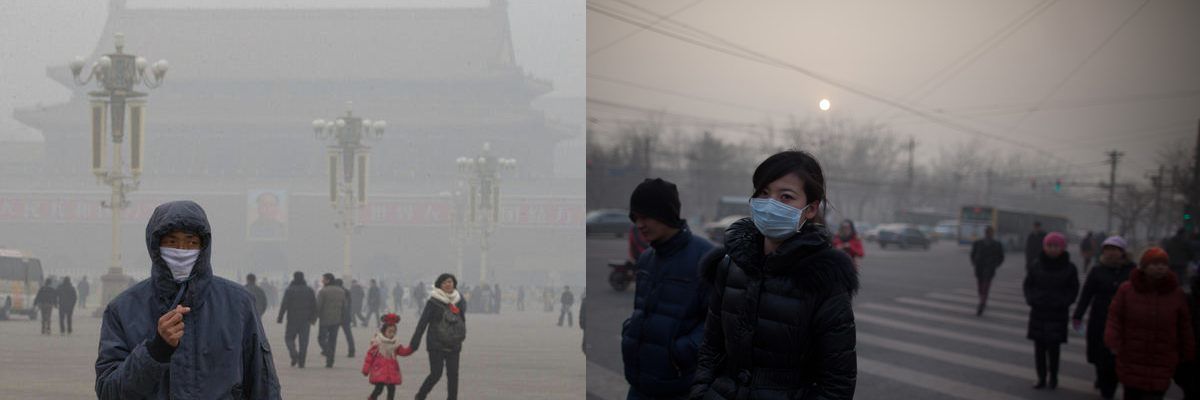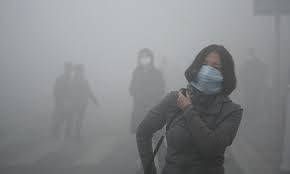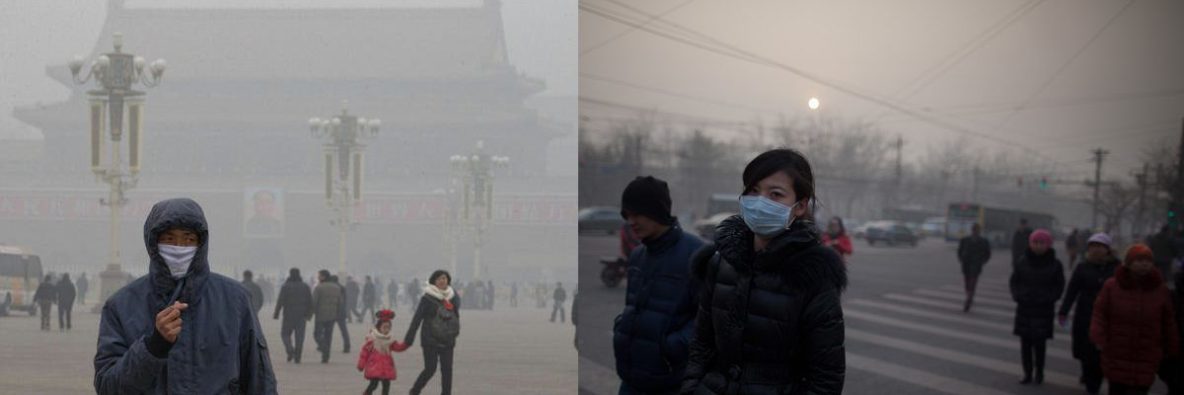
A lot of politicians have managed to miss the import of the very pointed comments made by Xi Jinping and Barack Obama about cutting carbon emissions.
The Chinese aren’t just talking. At a trade show in Shanghai last week, there were 32 electric cars – a football-field sized pavilion of them – on show from 12 manufacturers, excluding Tesla, with an additional 13 hybrid petrol-electrics for good measure.
Serious students of business know that the market always pre-empts regulatory change. Thus it is that electric cars are quite literally being mandated to critical mass in China by a state desperate to cut pollution. Laws enacted earlier this year by the Chinese mean that no less than 30 per cent of all new cars bought for official use each year must be “new energy” vehicles.

What is driving this ‘sudden’ push by China? Take a look at the picture. The air in China is often filthy for weeks on end in Shanghai, Beijing and scores of other towns and cities. A comprehensive study last year by the Chinese Ministry of Environmental Protection (MEP) found concentrations are 80–100 micrograms/cubic metre in some northern cities, such as Beijing and surrounding provinces, which is 5–6 times higher than the corresponding US standard. Particulates in 74 cities were about 76 micrograms per cubic metre for a given six month period – according to the WHO this concentration should not be over 25 micrograms per cubic metre.
And a related study from The Proceedings of the National Academy of Sciences, cited in the New York Times, found that China’s poor air quality – smoke along with particulate matter – is reducing the lifespan of its citizens. Between 1981 and 2001, particulate matter in China hovered around 400 micrograms per cubic metre. According to that study, every 100 micrograms of pollutants lowers life-expectancy at birth by three years. That’s ten years off your life.
It’s not just China getting serious about dirty fuel. In the US, natural gas-fired power plants (which are significantly cleaner than coal) accounted for just over 50% of new utility-scale generating capacity added in 2013. Solar provided nearly 22%, a jump from less than 6% in 2012. But coal only accounted for 11%, and those wind farms that offend our treasurer’s eyes nearly 8%. In total, a little over 13,500 megawatts of new capacity was added in 2013, half of it coming from gas.
It’s all part of a shift in the mix toward cleaner fuels, with renewables like wind and solar added to create a better outcome in terms of greenhouse gases. So whether or not you believe in climate change, oil and coal burn too dirty, relative to the renewables and gas which are coming on stream, and it’s this simple fact which is behind what the Chinese and the US are talking about. And what the market is already doing – in cars, power stations and coal/oil.
True, relative to China, Obama’s stance is more climate-change driven, but it doesn’t really matter, since the end result is the same – less oil and coal being burned by the big guys. The Australian government and the climate change deniers may have a half-decent point somewhere in their rhetoric, but it doesn’t matter, because the tide has turned, globally, and their policy stance is now irrelevant.
And what about the car companies themselves? We probably all need to do some work on the electric car makers, and not just Tesla, which has a market capitalisation of one third that of VW (owner of Audi, Bentley and Porsche). Just like every car maker in the world, they have a massive sunk cost petrol engine infrastructure that needs to be utilised to deliver a return.
In Australia, Ford and Holden have already pulled out, no doubt in part recognising the uncertainties of keeping aging plant operating in a car market where a growing percentage of production will be in vehicles which do not have gearboxes, clutches, starter motors, exhaust systems – in short, all the assorted paraphernalia that the electric vehicle will consign to the dust-bin of history.
What does this mean for investors? It may pay to look closely at the oil- and coal-driven companies listed in Australia to limit exposure ahead of what is clearly a radical shift in transportation technology. After all, the coal price has halved in the past year, while the oil price is off 20% in recent months. (Of course, nobody is suggesting that falling coal and oil prices is just about electric cars. There are big cyclical issues at play – there is a flood of supply in fossil fuels as US shale oil and gas comes on stream, while global growth is still anaemic meaning that demand is not strong either.)
The electric car issue is just the very tangible front end of a something that’s been bubbling along in the background for years, and which now will move front and centre. And the Chinese are right on top of it – in part because they don’t have to service a massive petrol engine infrastructure and in part because they have the critical mass to make it happen. But most of all because they are absolutely compelled to for the well-being of their own people.
Alex Pollak is CEO of Loftus Peak, the fund manager that specialises in building listed global portfolios for self-managed super funds.
Share this Post


